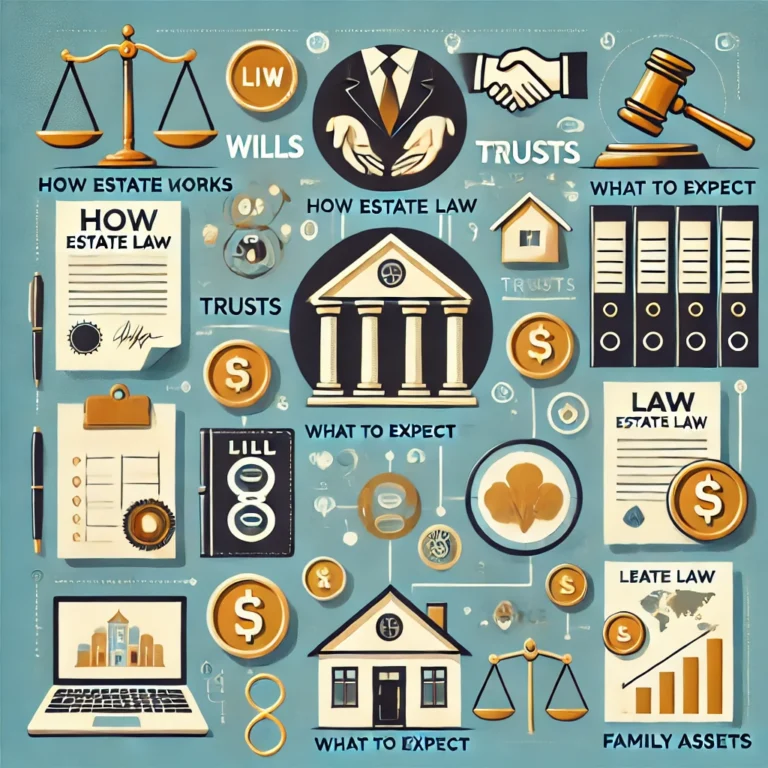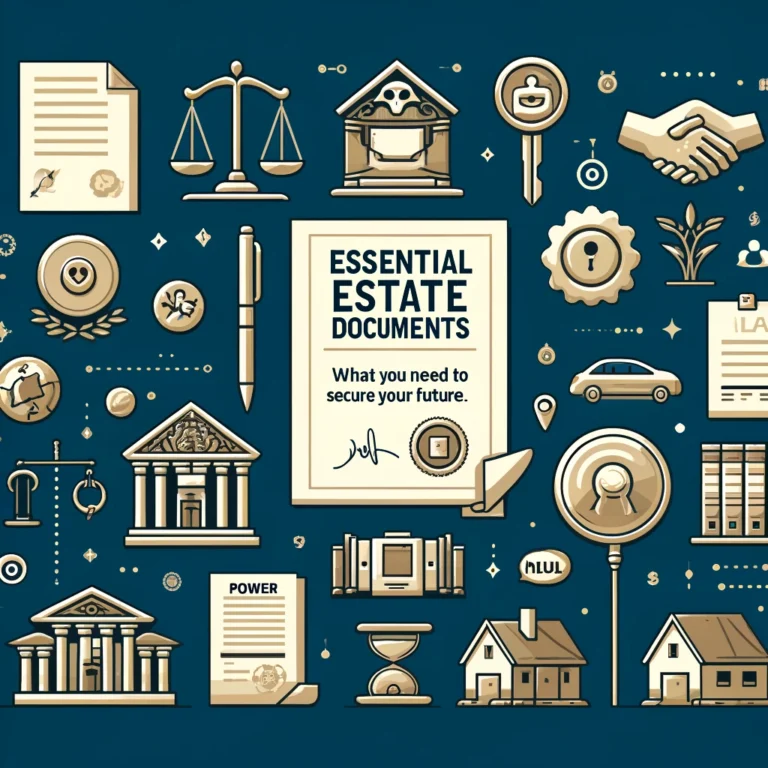Understanding Estate Law: A Comprehensive Guide for Beginners
Estate law might sound intimidating at first glance, but don’t worry, you’re not alone in feeling this way! It’s a complex topic, but with the right guidance, it can be broken down into easy-to-understand concepts. Whether you’re planning your own estate, managing one for someone else, or just curious, this comprehensive guide will take you through all the essentials of estate law in a simple and approachable manner. So, let’s dive in and explore everything you need to know!
What is Estate Law?
Estate law deals with the distribution and management of a person’s assets after they pass away. It’s about making sure that everything you’ve worked for during your life ends up in the right hands, whether that’s your family, friends, or a charity. Without a proper estate plan, your assets could be subject to complicated legal procedures or even go to unintended beneficiaries.
Why is Estate Law Important?
Ever wondered what happens to your property when you’re no longer around? That’s exactly where estate law steps in. It helps provide peace of mind, ensuring that your wishes are carried out and your loved ones are taken care of. Estate law also helps minimize disputes, tax burdens, and unnecessary legal complications that can arise when someone passes away without a clear plan in place.
Key Terms in Estate Law
Before we dive deeper, let’s clarify some key terms that will help you navigate estate law more easily:
- Will: A legal document outlining how you want your assets to be distributed after your death.
- Trust: A legal arrangement where a trustee manages assets for the benefit of a beneficiary.
- Executor: The person appointed in a will to administer the estate.
- Probate: The legal process of validating a will and distributing the deceased’s estate.
- Beneficiary: A person who inherits assets from a will or trust.
The Difference Between a Will and a Trust
One of the first decisions in estate planning is whether to create a will, a trust, or both. But what’s the difference between the two?
- Will: A will is a straightforward document that specifies who gets what after you die. It goes into effect only after you pass away and must go through probate, which can take time and cost money.
- Trust: A trust, on the other hand, allows you to transfer assets before your death, avoiding probate altogether. Trusts are often more flexible and private than wills, as they don’t become part of public records.
So, which one is better? That depends on your individual needs. Many people choose to have both to ensure all their bases are covered.
How Probate Works
Probate can be a lengthy and expensive process. It involves validating a deceased person’s will in court and distributing assets to the rightful heirs. If there’s no will, the estate goes through intestate succession, meaning the court will decide who gets what based on local laws. The probate process usually includes:
- Filing a petition with the probate court.
- Notifying heirs and creditors.
- Paying off debts.
- Distributing remaining assets to beneficiaries.
The downside? Probate can take months or even years, and the costs can add up quickly. That’s why many people aim to minimize the assets that have to go through probate by using trusts or other estate planning tools.
Who Needs Estate Planning?
Estate planning isn’t just for the wealthy or the elderly. If you have any assets, even if it’s just a car or a checking account, you’ll want to consider an estate plan. Why? Because without one, the state will decide how your assets are distributed—often in ways you wouldn’t have chosen. Whether you’re a young professional, a retiree, or a parent, estate planning is a smart move.
What Happens Without a Will?

If you die without a will, your estate is considered intestate, and state laws will determine how your assets are distributed. This process can be especially complicated if you have children from different relationships, business assets, or significant property. To avoid these complexities, creating a will or trust ensures your wishes are carried out exactly as you want.
Common Mistakes in Estate Planning
Estate planning might seem simple once you understand the basics, but many people make common mistakes that can cause issues down the road. Here are a few to avoid:
- Failing to Update Your Plan: Life changes—divorces, new children, and financial growth all affect your estate plan. Regularly updating it is crucial.
- Ignoring Taxes: Estate taxes can eat into your assets. Working with a financial planner can help minimize tax liabilities.
- Overlooking Beneficiary Designations: Life insurance policies and retirement accounts often have beneficiary designations that override your will.
How to Choose an Executor
Choosing the right executor for your estate is a critical decision. The executor’s role is to manage the distribution of your assets, pay off debts, and settle any legal matters after your death. Ideally, you want someone who is organized, trustworthy, and capable of handling financial matters. It doesn’t have to be a family member—sometimes choosing a neutral third party, like a lawyer, is the best option.
Living Wills and Medical Directives
Estate planning isn’t just about who gets your stuff after you’re gone. It’s also about making sure your medical wishes are followed if you become unable to make decisions for yourself. A living will outlines what kind of medical care you want (or don’t want) in case of incapacitation. A medical directive appoints someone to make healthcare decisions on your behalf.
What is a Power of Attorney?
A power of attorney (POA) is another critical document in estate planning. It gives someone the legal authority to make decisions on your behalf if you’re unable to do so. There are two types:
- Financial POA: Manages your financial affairs.
- Medical POA: Makes healthcare decisions for you.
Having a POA in place ensures that someone you trust is handling your affairs when you can’t.
Estate Taxes: What You Need to Know
Estate taxes, often referred to as the “death tax,” can be a significant burden on large estates. However, most people won’t have to worry about this because estate taxes only apply to estates over a certain value (which varies by jurisdiction). That said, proper estate planning can help minimize taxes and ensure that more of your assets go to your beneficiaries rather than the government.
Digital Assets and Estate Planning
We live in a digital world, and your online presence—social media accounts, email, even cryptocurrencies—are part of your estate. It’s essential to include instructions on how to manage or distribute your digital assets. You might even consider using a digital executor to handle these specific assets after your death.
How to Start Estate Planning
Feeling overwhelmed? Don’t be. Starting your estate plan can be as simple as making a list of your assets, choosing your beneficiaries, and meeting with a lawyer to draft the appropriate documents. The earlier you start, the more peace of mind you’ll have knowing everything is in order.
Do You Need a Lawyer for Estate Planning?
While you can create a basic will using online templates, consulting a lawyer is always a good idea, especially if your estate is large or complicated. A lawyer can help you navigate the complexities of estate law and ensure that your plan holds up in court.
Conclusion
Estate law doesn’t have to be a mystery. By taking a few simple steps, you can ensure that your wishes are honored, your loved ones are taken care of, and your assets are distributed according to your desires. Whether you’re just starting out or looking to update an existing plan, it’s never too early—or too late—to begin estate planning.
FAQs
1. What’s the difference between a will and a living will?
A will deals with the distribution of assets after death, while a living will outlines medical care preferences if you’re incapacitated.
2. Can I change my will once it’s written?
Yes, you can update or change your will as many times as needed. Just ensure it’s properly signed and witnessed.
3. How much does estate planning cost?
The cost can vary, but a simple will might cost a few hundred dollars, while a comprehensive estate plan with trusts could cost thousands.
4. Do I need to list all my assets in my will?
Not necessarily. Some assets, like retirement accounts or life insurance policies, have designated beneficiaries and don’t need to be listed in your will.
5. Is estate planning only for wealthy people?
No! Estate planning is for anyone who wants control over what happens to their assets and who makes decisions for them in the event of incapacity.







